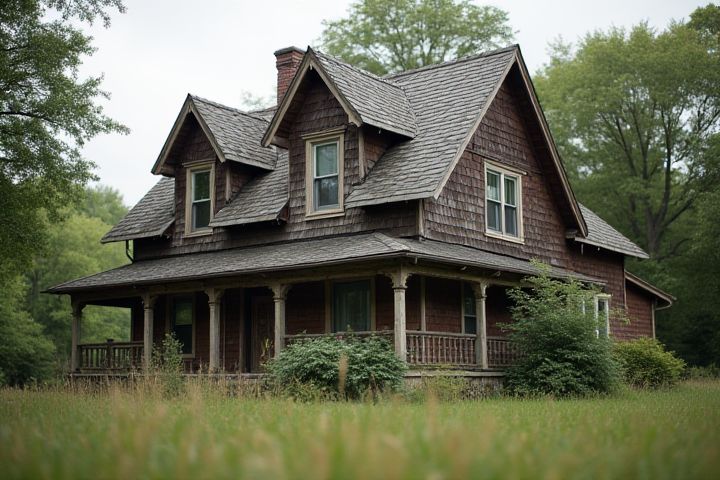
Several factors can contribute to your house losing value, including declining neighborhood conditions, such as increased crime rates or lower quality schools. Economic shifts, like a downturn in the local job market or rising interest rates, can also affect property values. Additionally, inadequate maintenance or significant structural issues within your home can deter potential buyers and reduce its worth. Market saturation, where the number of homes for sale exceeds demand, further compounds this problem. To increase your property's value, consider home improvements, regular maintenance, and keeping abreast of local real estate trends.
Why Is My House Losing Value
Market fluctuations
Market fluctuations significantly impact your home's value, as economic conditions play a crucial role in determining property prices. Changes in interest rates can diminish buyer affordability, leading to reduced demand in your local real estate market. Additionally, neighborhood developments or declines, such as an increase in crime rates or the loss of key amenities, directly affect perceived value. Keeping an eye on local market trends and economic indicators can help you better understand and mitigate potential losses in your home's worth.
Neighborhood decline
Neighborhood decline can be a significant factor in your house losing value. Deteriorating local infrastructure, such as poorly maintained roads, decreased public services, or rising crime rates, can deter potential buyers. The presence of vacant properties or commercial spaces can also contribute to a negative perception, affecting overall market demand. Furthermore, the decline of community amenities, such as schools, parks, and shops, may lead to a less desirable living environment, impacting your home's resale potential.
Poor property maintenance
Poor property maintenance can significantly affect your house's market value, with studies showing that neglected homes can lose as much as 10-20% of their value compared to well-maintained properties. Common issues such as peeling paint, overgrown landscaping, and roof damage not only deter potential buyers but also raise concerns about costly repairs. Inadequate maintenance may signal underlying problems, leading to lower appraisal values during a sale. Keeping up with regular repairs and updates is crucial, as even simple tasks like cleaning gutters or servicing appliances can help preserve your home's worth.
Outdated home features
Outdated home features can significantly decrease your house's market value by making it less appealing to potential buyers. Renovations invested in modern kitchens, bathrooms, and energy-efficient appliances often yield higher returns, while features like old wallpaper or outdated fixtures can deter offers. According to industry data, homes built in the last decade command approximately 10-20% higher prices than those with retro designs or unrenovated features. To enhance your property's value, consider prioritizing updates that align with current design trends and buyer preferences, ultimately attracting more interest and offers.
Oversupply in area
An oversupply of homes in your area can significantly impact property values. When too many houses are available for sale, competition increases, leading sellers to reduce prices to attract buyers. This saturation can create a perception that the market is declining, which can cause potential buyers to hold off on purchasing. As a result, your home's value may decrease as it becomes more challenging to sell amidst a surplus of options.
High crime rates
High crime rates in your neighborhood can significantly decrease your home's value by creating an environment that feels unsafe for potential buyers. Safety concerns often lead to reduced demand, making it challenging to sell your property at a favorable price. The presence of crime can also increase insurance premiums, further deterring prospective homeowners. As crime impacts the overall perception of the area, it is essential to address security and community improvement initiatives to help stabilize or boost your property's value.
Poor economic conditions
Poor economic conditions can significantly impact your house's value by reducing demand in the real estate market. When unemployment rates rise and consumer confidence declines, potential buyers may hesitate to invest in property, leading to increased inventory and lower prices. Additionally, areas experiencing economic downturns often face reduced investment in local infrastructure and amenities, further diminishing your home's attractiveness. If you live in a neighborhood severely affected by these conditions, it can exacerbate the decline in your property's market value.
Decreased curb appeal
Decreased curb appeal can significantly impact your home's market value, making it less attractive to potential buyers. Factors contributing to diminished curb appeal include overgrown landscaping, peeling paint, and outdated exterior features, which create a negative first impression. You may also notice that neglected driveways or walkways detract from the overall aesthetic, further reducing your property's appeal. Investing in regular maintenance, landscaping upgrades, and exterior improvements can enhance curb appeal and help maintain or increase your home's value.
Nearby construction projects
Nearby construction projects can significantly impact your home's value by altering the neighborhood's appeal and functionality. New developments may lead to increased traffic, noise, and potential overcrowding, which can make your area less desirable to potential buyers. Furthermore, while some construction may enhance local amenities, if projects are poorly planned or disruptive, they can deter interest in your property. It's essential to monitor these developments and consider how they might influence your home's marketability in the future.
Environmental hazards
Environmental hazards significantly impact property values, with issues like flooding, mold, or lead contamination leading to declining market appeal. Homes located in flood-prone areas can suffer substantial depreciation, sometimes exceeding 20% in value over a decade. Reports show that properties near toxic waste sites or frequent natural disasters can lose up to 30% of their worth. Buyers are increasingly factoring environmental risk assessment into their purchasing decisions, which directly influences your property's marketability.
